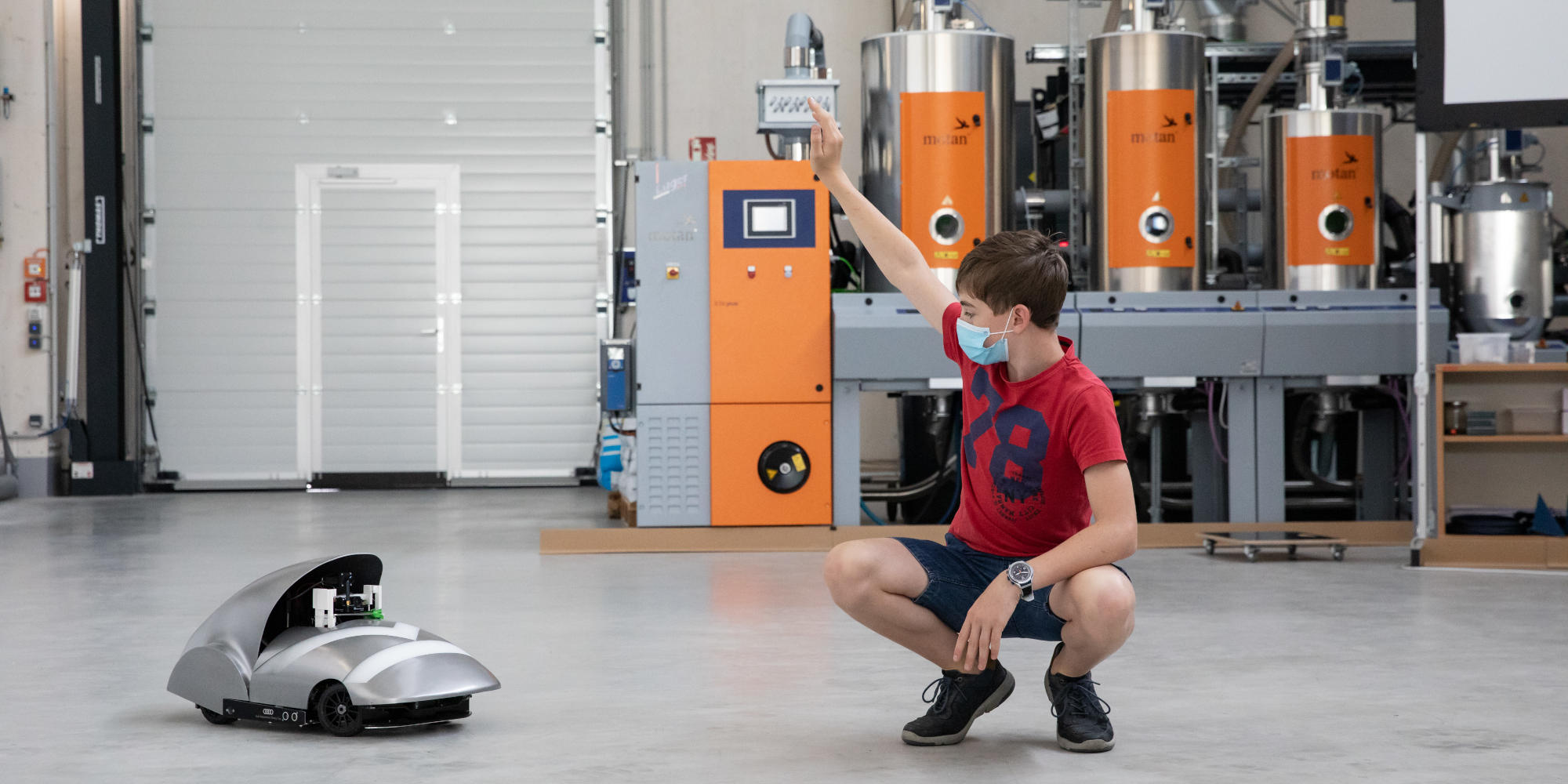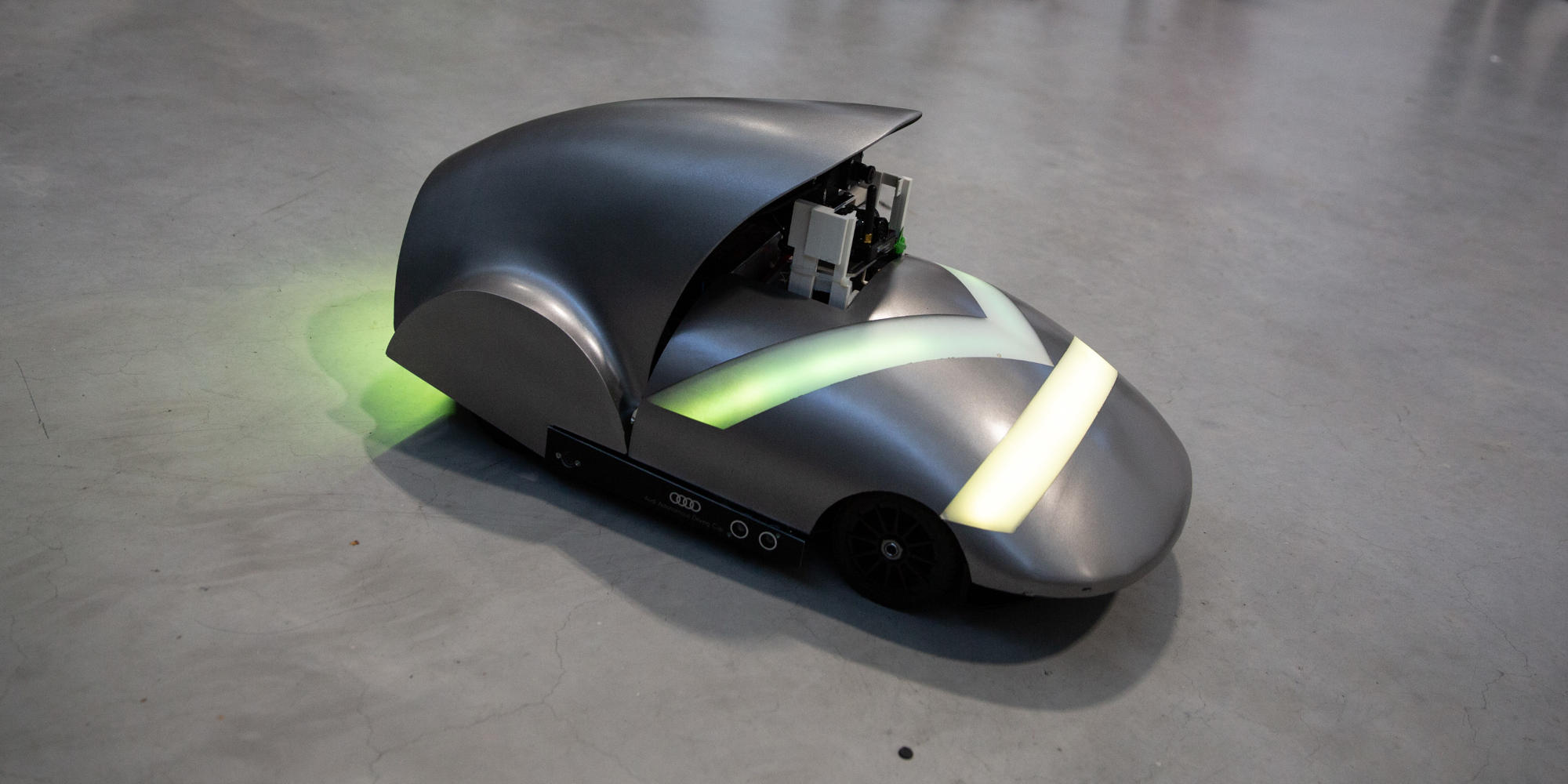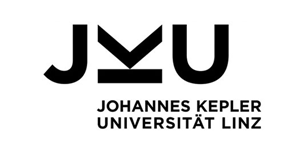K is a likeable little robocar: small in size, but very smart on board! Named after JKU’s famous patron, Johannes Kepler, it drives itself autonomously on changing terrain, can predict the movement patterns of pedestrians and playfully interacts with its environment.

K – JKU’s Interactive Robocar
To correctly assess demanding situations and derive fast driving maneuvers, an aggregated use of technologies such as SLAM (Simultaneous Localization and Mapping), Reinforcement Learning and Image Recognition is needed. Via its LED-equipped shell and nonverbal cues, K communicates inner states and intentions to the people around it. Our robocar might get annoyed if you block its path for too long but, for the most part, K is in a good mood. K optionally shares its camera view and a visual representation of its inner perceptions in real time with an external screen. Audience groups can thus “see through the eyes” of the robocar and develop a better understanding of modern AI methods. With K, research at JKU in the fields of AI, Autonomous Driving and Human-Robot Interaction is made tangible to all.
Project Credits / Acknowledgements
Institute for Machine Learning, Johannes Kepler University
LIT AI Lab, Johannes Kepler University
LIT Robopsychology Lab, Johannes Kepler University
Inseq Design
Supported by Land Oberösterreich
Biography
LIT Machine Learning Lab
Project Lead: Dr. Bernhard Nessler
Dr. Bernhard Nessler is the project lead of the robocar “K” project. In 2004, he finished his degree in Telematics at the Graz University of Technology and became the general manager of the family business “Nessler Medizintechnik”. After acquiring his PhD in Theoretical Neuroscience, Bernhard Nessler started working at the JKU Institute for Machine Learning in 2015. He is currently holding various positions, including being a faculty member at ELLIS, vice president of ASAI and leader of the Audi.JKU Deep Learning Center.
Project Assistants: Lars Neuser, Alexander Gaisbauer, Mykyta Ielanskyi, Sarah Howorka, Anamaria Roberta Preda, Bernhard Voggenberger, Fathy Shalaby, Christian Ganhör, Gernot Zöcklein, Daniel Louback, Alexander List, Julia Grothues
LED Signal Design
LIT Robopsychology Lab
Univ.-Prof.in Dr.in Martina Mara earned her doctorate in Psychology at the University of Koblenz-Landau with a dissertation on anthropomorphic machines. After having worked for non-university research institutions such as the Ars Electronica Futurelab and the Institute of Design Research Vienna for more than a decade, she became Professor of Robopsychology at the Johannes Kepler University Linz in 2018. Her current research interests include psychological effects of simulated human-likeness and intention signaling of collaborative robots. Mara is a member of the Austrian Council for Robotics and Artificial Intelligence (ACRAI), a board member of the Ludwig Boltzmann Society, and a newspaper columnist. Among other awards, she received the Vienna Women’s Prize and the Futurezone Award in the “Women in Tech” category.
Laura Moradbakhti, MSc is a Research Assistant and Doctoral Candidate at the LIT Robopsychology Lab. Moradbakhti holds a BSc in Applied Psychology and a MSc in Social Cognition. She has previously interned in the division of Predevelopment for Autonomous Driving at AUDI. Her research focuses on Human-Machine Interaction.
Dipl.-Ing. Franz Berger is a Research Assistant at the LIT Robopsychology Lab. He holds a MSc in Computer Science from the JKU. Berger specialized on Machine Learning and Data Science.
“K” Car Shell Design
Inseq Design
Jakob Illera (Inseq Design) (1975), studied product design at the University of Applied Arts Vienna and the Berlin University of the Arts. Teaching at the Technical University of Vienna, university assistant at the University of Applied Arts Vienna. Founder of the international design studio INSEQ DESIGN. Current projects: exhibition design of the Natural History Museum Vienna, mobile bicycle stage Veloconcerts and public installation John Gerrard in Galway.
Jürgen Steineder has studied Industrial Design at the University of Applied Arts Vienna. Within his artistic practice he focuses on the influence of technical devices and artifacts on our daily lives. After exploring different design approaches at the University of the Arts in Berlin and the Design Academy Eindhoven, he is currently working as a Designer in Vienna.



